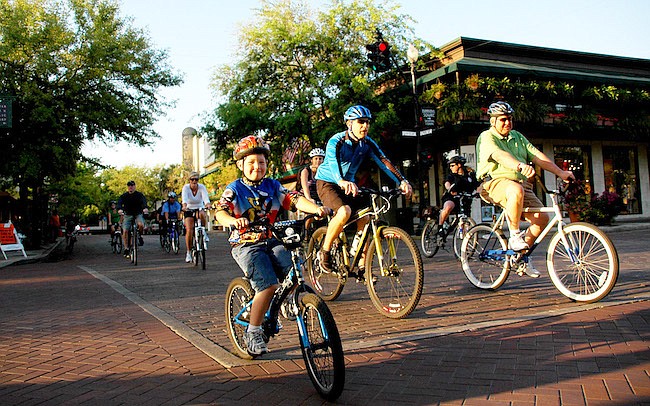- October 23, 2024
-
-
Loading

Loading

It’s been five years since Healthy Central Florida set the goal of making our community the healthiest in the nation, and this week leaders in Maitland, Winter Park and Eatonville spent time reflecting on how far they’ve come.
During Monday’s Maitland City Council meeting, Mark Fenton – a national public health, planning, and transportation consultant – gave the city an update on how he thinks Maitland is doing when it comes to promoting public health. Fenton gave similar presentations across the area this week, including a meeting between all three Healthy Central Florida partner cities on Monday, and one at the University Club of Winter Park at an event hosted by the Winter Park Chamber of Commerce on Tuesday.
Overall, Fenton said, since his last visit to Maitland in 2015, the city is moving in the right direction.
“Congratulations and thank you for the good work you’re doing,” he said. “You laid out plans over the last (few) years to say you’re going to be making these changes, making it in fact safer to walk and bike, creating a downtown that is a livable place and destination that you can come to and park your car once, shop, visit, walk, enjoy, socialize – you’re doing it.”
Since Fenton’s last visit, Maitland has approved its major downtown revitalization project – Maitland City Centre – and installed projects focused on pedestrian and cyclist safety, such as a boardwalk connecting the SunRail station to nearby neighborhoods, and way-finding bike path signs throughout the city. The city is also working to make its soon-to-be main street, Independence Lane, a pedestrian destination.
The way-finding signs are still as work in progress, as the city works to educate residents on how to read them, but Fenton said they are a great step in the right direction. Fenton said the city needs to keep trying new things when it comes to encouraging public health to see what sticks. One issue yet to be solved includes how to get pedestrians and bicyclists across U.S. Highway 17-92 so they can safely cross to visit Maitland’s new downtown once it’s built.
“The [cities] that are being the most successful are the ones who are doing it … they are trying stuff that is good and better than what is there now,” Fenton said. “And it’s working.”
Maitland Public Works Director Rick Lemke said the city has more projects in the works including installing new, critical sidewalk connections and working with the Florida Department of Transportation to ensure the functionality of the pedestrian bridge being installed over the soon-to-be expanded Maitland Boulevard.
Maitland Mayor Dale McDonald said these changes are necessary for the city as it looks toward the future.
“The point is, if we don’t make the commitment to do something different, we’re going to continue to get what we’ve got,” McDonald said.
Reflecting on the past five years, Healthy Central Florida Executive Director Jill Hamilton Buss said it’s each of those small changes building upon one another that are helping to build a healthier community.
“Overall I’m thrilled,” she said. “I think in five years we’ve made incredible progress.”
A lot of that is in changing the culture of the community, she said, and encouraging people to give more thought to healthier options. One major accomplishment of the past five years, she said, was launching Breathe Free Winter Park, which encouraged restaurants with outdoor seating to go smoke-free. Now, that program is rebranded as Breathe Free Central Florida, as the nearly 50 restaurants that have joined span beyond Winter Park to Maitland, Eatonville and Orlando.
Other successes born out of Healthy Central Florida, she said, include the free bike checkout programs at the Winter Park and Eatonville public libraries, and walk and bike to school initiatives across all three cities.
Hamilton Buss said she also saw a big leap in progress in Winter Park when it recently approved its new Comprehensive Plan, in which, she said, it prioritizes engineering to benefit bike, pedestrian and commuter transportation options over cars.
“We’ve got to make the community walkable and accessible to people of all ages and abilities,” she said.
That, she said, includes installing wider sidewalks that make it easier for those in wheelchairs and walkers to make it to their destinations safely, and creating safer spaces away from traffic for use by bikers who aren’t confident riding among cars. The Cady Way Trail cycletrack, she said, is a good example of that.
Next month, Healthy Central Florida will host its annual Bike to Work Day on March 8, culminating with a group ride pedaling off from Winter Park’s Central Park at 4 p.m. And on May 6, she said, all of the Healthy Central Florida partner cities are teaming up to host a bicycle awareness day, where the cities teach their residents how best to safely bike in their communities, including using designated paths and bike lanes.
“We’ve got to continue to do things that change the environment and change the culture to make it easier for people to make the healthy choice,” Hamilton Buss said.
“I think we’re moving in the right direction…we’re not there yet, but we’re moving.”